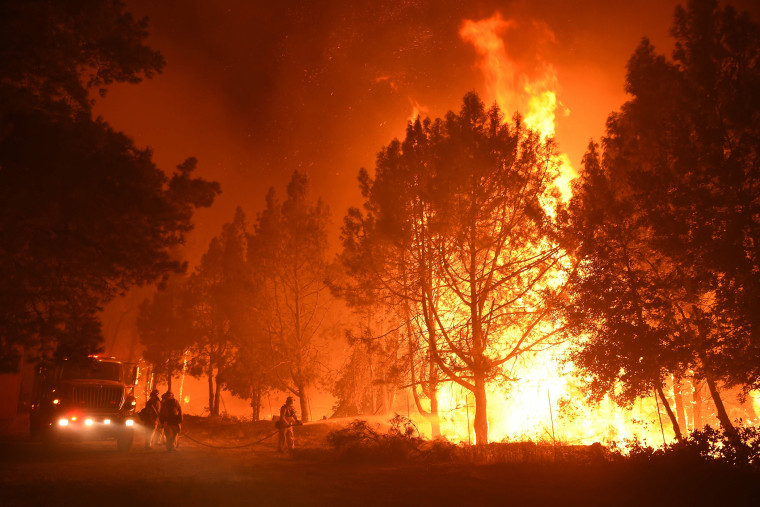Northern California continues to deal with a brutal wildfire -- now in its second week -- which has scorched more than 283,000 acres and killed two people. On July 27, Donald Trump declared a state of emergency in the state and authorized FEMA to help the disaster areas. That, obviously, was the right thing to do.
Yesterday, however, the president decided to start tweeting about the subject, which was clearly the wrong thing to do.
Trump insisted, for example, that California Gov. Jerry Brown (D) "must allow the Free Flow of the vast amounts of water coming from the North and foolishly being diverted into the Pacific Ocean.... Think of California with plenty of Water - Nice!" The president added, "California wildfires are being magnified & made so much worse by the bad environmental laws which aren't allowing massive amounts of readily available water to be properly utilized."
Part of the problem is that Trump has absolutely no idea what he's talking about. NBC News reported late yesterday:
[T]he experts who have actually been involved in the crisis say there is no foundation to that claim.Instead, they said the fire crews have had plenty of water to fight 17 fires, which, the experts noted, have been made more likely and more intense during the prolonged fire seasons that have come with climate change.... A spokesman for the state fire agency said crews battling blazes around California had experienced no water shortages during the prolonged siege.
When Scott McLean, a spokesman for the California Department of Forestry and Fire Protection, was asked what might have prompted Trump's strange missives, McLean responded, "I have no idea."
But we do have some idea. Trump learned a couple of years ago about a dispute over water flowing into San Francisco Bay to support wildlife, which some want to be used in support of agriculture. Evidently, the president mangled the details, connected two unrelated situations, and felt comfortable flaunting his ignorance to the world.
And while that's embarrassing enough, that's only part of the problem.
One of the staples of the Trump presidency is his apparent inability to demonstrate a sense of empathy. His tweets on California wildfires are emblematic of the larger phenomenon.
Consider the conditions in the abstract: a state is dealing with a deadly natural disaster, and federal officials are assisting in the response. There's no need for the president to say anything, though if he feels compelled to weigh in, he could express inoffensive support for the first responders and affected communities.
But not Trump. This president saw the disaster and decided it was a good time to peddle demonstrable nonsense, falsely accusing the governor of being "foolish," and falsely blaming "bad environmental laws" for exacerbating the crisis.
Even putting aside the president's stunning ignorance, what part of his character led him to believe it'd be appropriate to lash out publicly at a state during a natural disaster?
That'd be like reminding Puerto Rico in the aftermath of Hurricane Maria of its Wall Street debts -- which, incidentally, is exactly what Trump did last September, shortly before he feuded with a local mayor and threw paper towels to locals as if he were shooting free throws.
As a candidate, the future president, referring to himself in the third person, said empathy would be "one of the strongest things about Trump."
